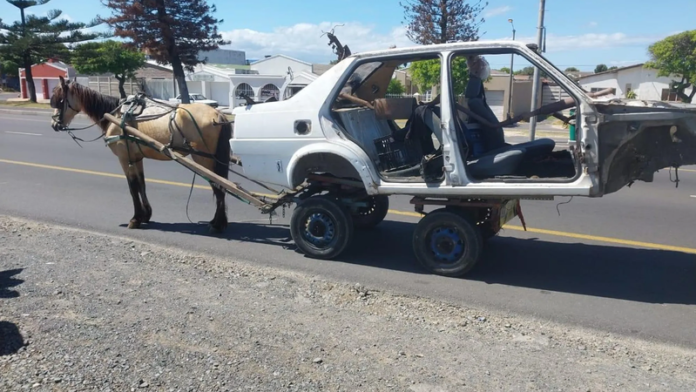The Cape Town SPCA is sounding the alarm over a disturbing rise in cruelty cases involving working equines, urging the City of Cape Town to collaborate on solutions to protect these vulnerable animals.
In the past six months alone, the SPCA has intervened in at least six cases of severe animal abuse, highlighting a systemic problem of exploitation that demands immediate attention.
Spokesperson Belinda Abraham detailed several harrowing incidents, beginning with the case of Hope, a young pony weighing just 360kg, discovered in Kensington in September 2024 struggling under an unimaginable load.

“Hope was forced to pull a cart loaded with an engineless vehicle and four passengers,” Abraham explained.
“The combined weight of the cart and vehicle alone reached a staggering 990kg — nearly three times her body weight. Hope’s muscles trembled with exertion, and she arrived at the SPCA lame and in distress.”
Hope was the first of three ponies rescued under similar circumstances.
In November 2024, a severely underweight stallion named Spirit, weighing only 240kg, was found on Highlands Drive in Mitchells Plain pulling a cart carrying a broken vehicle weighing 980kg – a load significantly exceeding his capacity.

“In addition to being overworked, overburdened, and underfed, Spirit’s hooves were also neglected,” Abraham stated.
The most recent case involved Lady Grace, a petite and malnourished pony found pulling an overloaded cart along Old Strandfontein Road in Ottery. Again, the load consisted of a broken vehicle, exceeding three times her body weight.
“Like the others, Lady Grace’s hooves were in dire condition, and she is underweight,” said Abraham.
She added that Grace requires a special diet to recover, including oat hay, lucerne, and supplements, along with expert care from an equine farrier and dentist – services the SPCA must outsource at considerable cost. “We need the public’s help,” Abraham appealed.
The SPCA emphasised that beyond the immediate suffering caused by the excessive loads, the animals showed clear signs of long-term neglect. Their physical condition, marked by underweight bodies and neglected hooves, is testament to the daily hardships they endure.
Abraham highlighted that these cases violate Section 2(1)(a) of the Animals Protection Act No. 71 of 1962, which prohibits overloading animals. Convictions under this legislation carry penalties of up to R40 000 in fines or 12 months imprisonment. Furthermore, she noted the blatant disregard for the South African National Standards (SANS) for working equines, which establish weight limits designed to protect the animals' health and welfare.
“Despite their importance, these standards require broader enforcement and awareness to safeguard working animals effectively,” she stressed.
In a proactive step, the SPCA engaged with the City of Cape Town on 15 January to discuss solutions.
“The meeting was highly positive, with both parties expressing a shared commitment to proactive measures that protect working equines,” Abraham reported.
The SPCA remains optimistic about future collaboration to develop practical solutions that balance animal welfare with the livelihood needs of owners who rely on working animals.
“We are committed to finding a solution that benefits the welfare of animals and supports sustainable livelihoods,” Abraham concluded.











